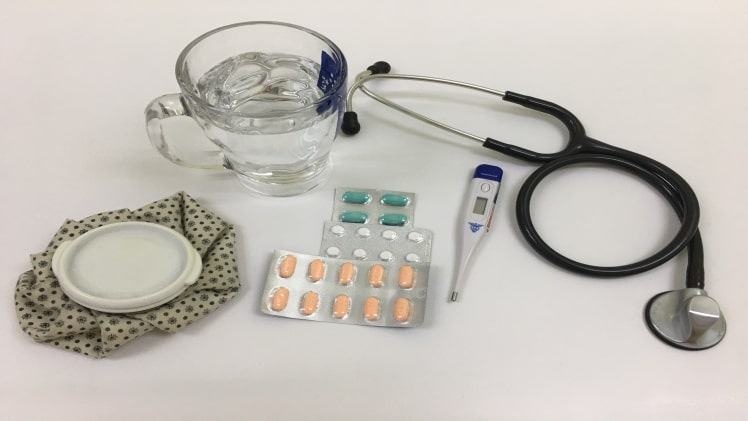I recently had Covid, and among the many strange symptoms were waking up daily with cold sweats. Yikes! It felt so weird because in the evenings I was usually shaking, therefore putting on extra heat and wrapping layers, so I made sure I was anything but cold at night. Yet, I kept waking up in plenty of chilly cold sweat. I remember this barely happened to me earlier, maybe once or twice in childhood, so I decided to look into this weird subject.
In my case, among the other strange symptoms of Covid was the unbelievable amount of sleep that my body required. At times, I slept over full days and nights in a row. Deeply. Wow. Never thought before I could have done that for weeks even. I could work in the beginning, but later it got worse. This virus doesn’t at all feel natural… Anyway, back to cold sweats and the significant information I learned and you may find useful as well:
Normal Sweats versus Cold Sweats
Under normal circumstances, sweating is the body’s reaction to various inner or outer stressors. Normal sweating happens when the body feels too warm or being over forced, and is cooling down by evaporating. As opposed to cold sweating, which can happen for various reasons. From shivering through night sweats to diaphoresis. Diaphoresis can be triggered by an illness or some medication.
A Fight or Flight Response
The most interesting fact I found is that anything that causes a fight or flight response to the body can lead to cold sweats. The best way to deal with cold sweats is to find what may cause it. Another fascinating thing about cold sweats is that they appear suddenly and at any temperature. I also found that this kind of sweat can come at night in sleep, as opposed to some misbelief there’s a difference between night sweats and cold sweats, but there is not.
They are all diaphoresis though and could mean a more serious underlying problem. Why there is no exact specific treatment is because we need to observe the exact cause, which could be many. Like shortness of breath, which could be helped by giving oxygen to the patient helping them breathe better, and dry their skin. But cold sweats are also related to shock when seriously low levels of blood flow to the brain and other key organs.
Infection and Cold Sweats
Fever caused by any infection can also cause cold sweats. Interestingly, cold sweats often appear when the patient’s temperature starts going down. One of the extreme infectious conditions is called sepsis, which can both lead to shock and cold sweats. You need to call the ambulance if there is no sign of fever before the cold sweats appear, and there are any signs of shock, such as a sudden and rapid heartbeat or rapid breathing, weak pulse or feeling weak or dizzy, and pale skin.
Shortness of Breath
Serious shortness of breath can cause lower levels of oxygen in the bloodstream. One of the stress responses of craving oxygen could be that the patient is getting cold sweats.
Heart Attack
A heart attack can also cause cold sweats, and you should call the ambulance if you see someone with chest pain or pressure, including in the arm or neck area. You should ideally get aspirin to the patient while waiting for the ambulance.

Pain After Injuries and Operations
Broken bones, fractures, severe operations, and amputations can all lead to cold sweats. If the patient with a broken leg is sweating we could be sure that he is in huge pain and needs something to soothe the pain, if he is not taking something already.
Fear and Anxiety
The two big causes of stress. Many people are prone to panicking or have everyday stress or anxiety in their lives that directly leads to a fight or flight response, which of course causes cold sweats.
Fainting
A patient can faint when they don’t get enough oxygen in their brain. Cold sweats can both happen right before or after someone faints. Fainting can happen for many reasons, including dehydration, being exhausted, poor blood flow and circulation, sweating too much, getting too hot or over-exercising, having heart conditions that make someone’s heartbeat too fast or too slow.
Low Blood Glucose in Diabetes Patients
People with diabetes can sometimes have too little level of sugar in their bloodstream. This can be as alarming to the brain as the shortage of oxygen. Since the mind thinks it’s an emergency, it again responds with the fight or flight scenario, including cold sweats. If you see someone with diabetes feeling dizzy and confused, you should call the ambulance and if you can give them glucose or fruit juice if they can drink, that would be great.
Endnote
As there can be so many reasons for cold sweats, it is not always easy to find what triggered it. They can either imply an underlying problem or in other cases signal hormonal changes that come with menopause or such chronic conditions as cancer. If you or someone you know has regular cold sweats, it is a good idea to discuss your symptoms and medical history with your healthcare provider.

